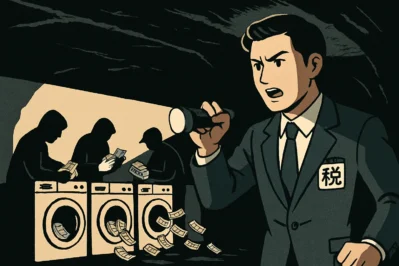Korea’s Shadow Economy: K-Drama Style!
Hello! Welcome to Maeil Hangul, here to upgrade your Korean skills to the next level!
Today, we’re diving into a sophisticated and fascinating topic that you’ll encounter in Korean news, academic discussions, and even thrilling dramas: the shadow economy and its impact on tax revenue. This isn’t just dry economics; understanding these concepts will give you a deeper insight into the inner workings of Korean society. Lately in Korea, there’s been a huge buzz around dramas like “Tracer” (트레이서), which follows a team of fearless tax collectors. This has brought complex topics like tax evasion and the “shadow economy” right into the heart of popular culture, making it the perfect time for us to master the related vocabulary!
Key Expressions You Need to Know
Here are some essential terms to help you discuss economic policy like a pro.
- 한국어 표현: 지하경제 (地下經濟)
- 발음 [로마자]: Ji-ha-gyeong-je
- 영어 뜻: Shadow Economy / Underground Economy
- 상세 설명: This term literally means “underground economy.” It refers to all economic activities and transactions that are deliberately hidden from government authorities to avoid taxation or regulation. This includes everything from unreported income by freelancers to large-scale illegal operations. It’s a formal term used frequently in news reports and economic analyses.
- 한국어 표현: 탈세 (脫稅)
- 발음 [로마자]: Tal-se
- 영어 뜻: Tax Evasion
- 상세 설명: This refers to the illegal act of intentionally not paying taxes that are owed. It’s a strong, negative term. It’s important to distinguish it from 절세 (jeol-se), which means “tax avoidance” or finding legal ways to reduce one’s tax burden. While 절세 is considered smart financial planning, 탈세 is a crime.
- 한국어 표현: 세수 결손 (稅收 缺損)
- 발음 [로마자]: Se-su gyeol-son
- 영어 뜻: Tax Revenue Shortfall
- 상세 설명: This is a more advanced term you’ll see in economic news. 세수 means “tax revenue,” and 결손 means “deficit” or “shortfall.” Together, it describes a situation where the government collects less tax revenue than it had projected in its budget. A large 지하경제 is often cited as a major cause of 세수 결손.
- 한국어 표현: 자금 세탁 (資金 洗濯)
- 발음 [로마자]: Ja-geum se-tak
- 영어 뜻: Money Laundering
- 상세 설명: Literally “fund washing,” this term describes the process of concealing the origins of illegally obtained money. Criminals funnel their “dirty” money through a series of transactions to make it appear as if it came from a legitimate source. It’s a key mechanism that allows the 지하경제 to flourish.
Example Dialogue: K-Drama Critics
Let’s see how these words pop up in a conversation about a popular TV show.
A: 요즘 드라마 ‘트레이서’ 봤어? 정말 박진감 넘치더라.
(Yo-jeum deu-ra-ma ‘Teu-re-i-seo’ bwas-seo? Jeong-mal bak-jin-gam neom-chi-deo-ra.)
“Have you seen the drama ‘Tracer’ lately? It’s so thrilling.”
B: 응, 국세청 직원들이 탈세를 추적하는 방식이 정말 대단해. 한국의 지하경제 규모가 얼마나 클 수 있는지 보여주는 것 같아.
(Eung, guk-se-cheong jik-won-deu-ri tal-se-reul chu-jeok-ha-neun bang-sik-i jeong-mal dae-dan-hae. Han-guk-ui ji-ha-gyeong-je gyu-mo-ga eol-ma-na keul su it-neun-ji bo-yeo-ju-neun geot ga-ta.)
“Yes, the way the National Tax Service agents track down tax evasion is incredible. It feels like it shows just how big Korea’s shadow economy can be.”
A: 맞아. 정부가 그런 불법 행위를 막지 못하면 심각한 세수 결손으로 이어질 수도 있겠어.
(Ma-ja. Jeong-bu-ga geu-reon bul-beop haeng-wi-reul mak-ji mot-ha-myeon sim-gak-han se-su gyeol-son-eu-ro i-eo-jil su-do it-get-sseo.)
“Exactly. If the government can’t stop those illegal activities, it could lead to a serious tax revenue shortfall.”
B: 특히 드라마에서 보여주는 교묘한 자금 세탁 수법들은 정말 현실을 반영한 것 같아서 소름 돋았어.
(Teuk-hi deu-ra-ma-e-seo bo-yeo-ju-neun gyo-myo-han ja-geum se-tak su-beop-deu-reun jeong-mal hyeon-sil-eul ban-yeong-han geot ga-ta-seo so-reum dot-at-sseo.)
“Especially the clever money laundering techniques they show in the drama; they seemed so realistic it gave me chills.”
Culture Tip & Trend Deep Dive
Dramas like “Tracer” aren’t just entertainment; they tap into a real public sentiment in Korea regarding economic justice and fairness. The 국세청 (Guk-se-cheong), or National Tax Service, is often portrayed as an incredibly powerful agency, representing the state’s authority to ensure everyone pays their fair share.
One uniquely Korean system you should know about, designed to bring the 지하경제 into the light, is the 현금영수증 (hyeon-geum-yeong-sujeung) or “cash receipt” system. When you pay with cash, you can provide your phone number, and the transaction is officially recorded. In return, you receive a significant income tax deduction at the end of the year. This brilliant policy incentivizes consumers to help the government track cash transactions, making it harder for businesses to hide their income! So next time you’re in Korea and pay with cash, don’t be surprised if the clerk asks, “현금영수증 필요하세요?” (Do you need a cash receipt?).
Let’s Practice!
Great job making it this far! You’ve learned some high-level vocabulary today. Let’s see if you can put it to use.
Fill in the blank with the most appropriate term from today’s lesson:
- The news report stated that the expansion of the (________________) is a primary cause of the recent tax revenue shortfall.
(뉴스 보도에 따르면, 최근 세수 결손의 주된 원인은 (________________)의 확대라고 한다.)
Ready to challenge yourself? What are your thoughts on using popular media like dramas to educate the public on complex social issues?
Leave a comment below using the expressions you learned today! We’d love to hear from you!






